Stock Exchange
Requirements and User stories
Functional requirements
- As a user, I would like to get the real time stock information, like price, open, close and volume.
- As a user, I would like to be able to place an order at a specific price.
- Market order: Place an order at the latest market price.
- Limit order: Place an order at the specific price.
- Stop loss order: Place an order at the specific price, only match under a particular condition.
- Fill-Or-Kill order: Place an order at the specific price, only match once.
- As a user, I would like to be able to update or cancel a pending order.
- As a user, I would like to see my order history.
- As a user, I would like to get notified once my order gets executed.
Non functional requirements
- The system needs to be highly consistent. If my phone app shows the order has been executed, it should not show pending on web browser.
- The system needs to be functioning if some nodes have encountered network partition or failure.
- High write rates and low latency for millions of users.
Calculation
- Five million qps.
- Tens PB of data per day.
- Over sixteen PB data in data lake.
Data model
type Account struct {
AccountID string
Balance float32 // what is the available balance
// contains account related information, like payment methods, external bank account info, etc.
}
type Order struct {
AccountID string // record who placed the order
OrderID string // auto-generated id to record the order
PlaceTime string
Symbol string // APPL
Type string // buy or sell
Price float32
Quantity int
Expires string // if the order is not executed, when it expires
Status string // record the order status: acknowledged, filled, rejected, canceled
...
}
type OrderHistory struct {
AccountID string
Orders []Order
}
// This could be used to show the holdings of an account
type Position struct {
AccountID string
Symbol string
Quantity int
CostBasisPerShare float32
}
APIs
Client side RESTful API
- Place order:
PUT api/v1/order/place - Update order:
POST api/v1/order/update - Cancel order:
POST api/v1/order/cancel - Query stock price:
GET api/v1/stock/<symbol>
Architecture

Match engine
More details on match engine could be found from this blog and this blog.
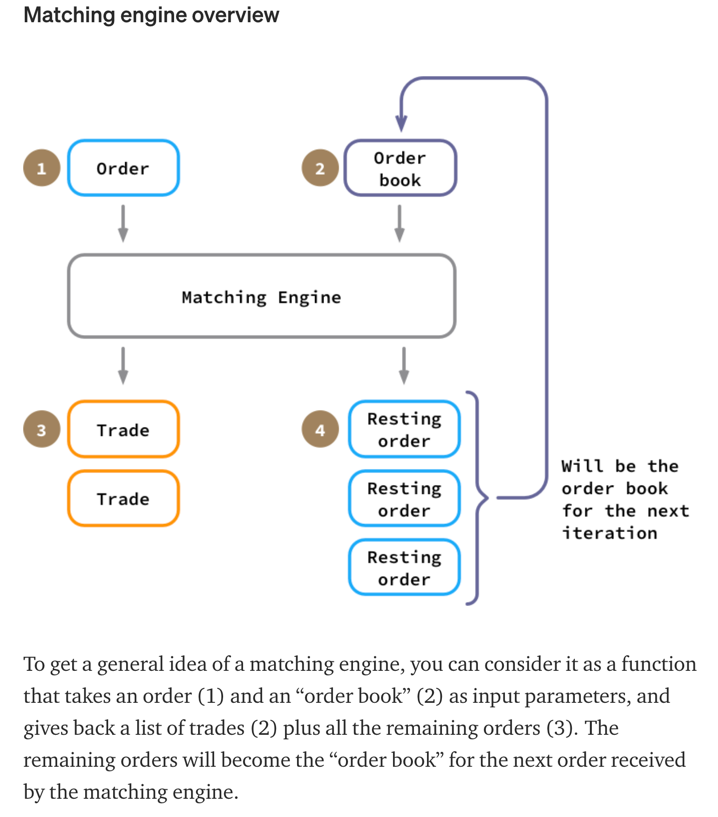
- Offers(Sells) are sorted with the lowest price at the beginning(Seller order book).
- Bids(Buys) are sorted with the highest price at the beginning(Buyer order book).
This kind of sorting mechanism is to make sure there are high possibilities order could match.
- Based on different strategy, match engine ties to match orders.
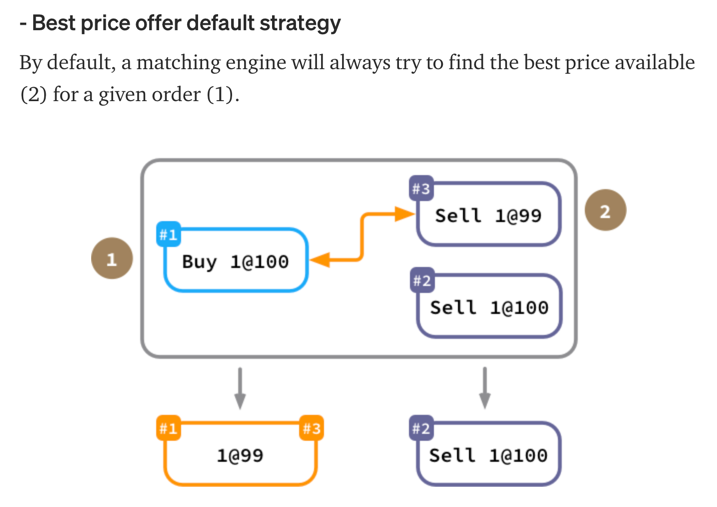
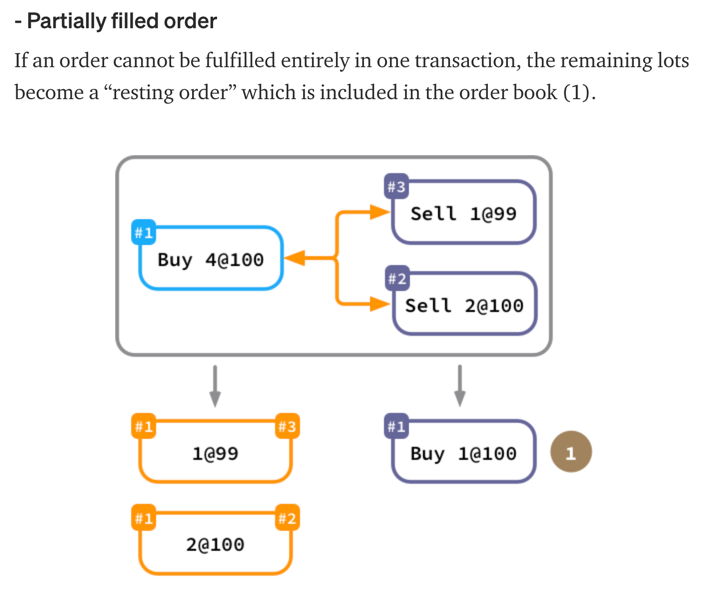
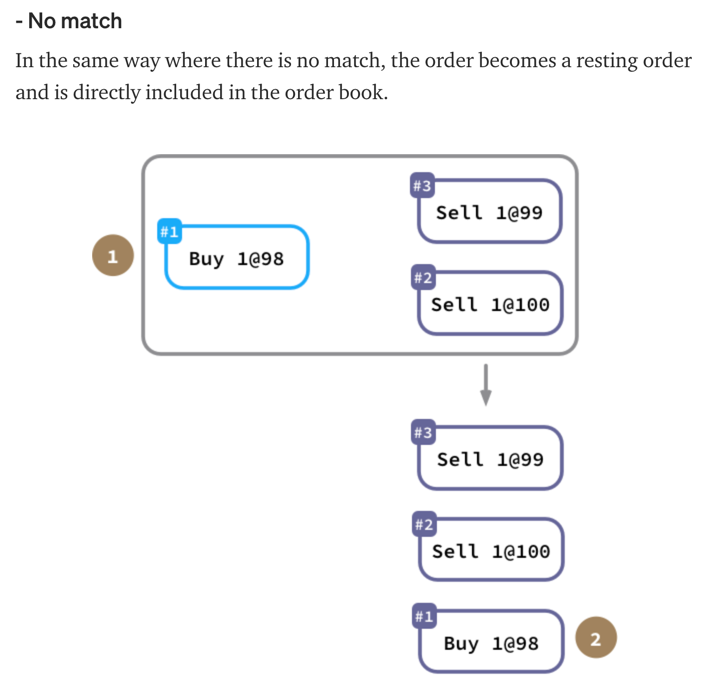
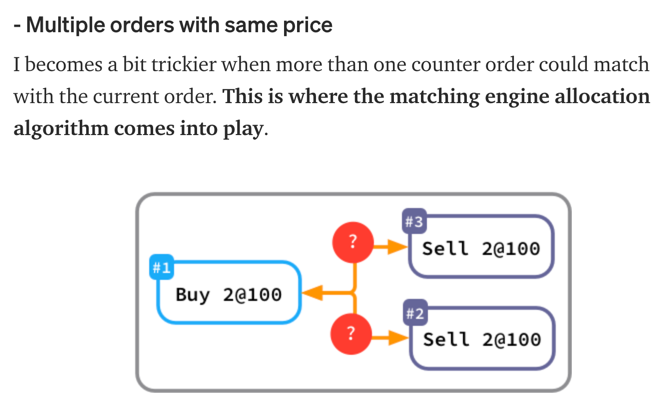
-
FIFO
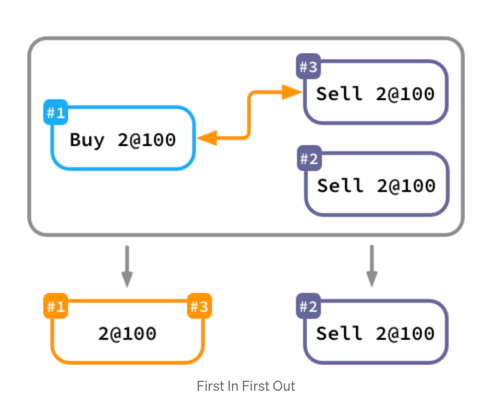
-
Pro-rata
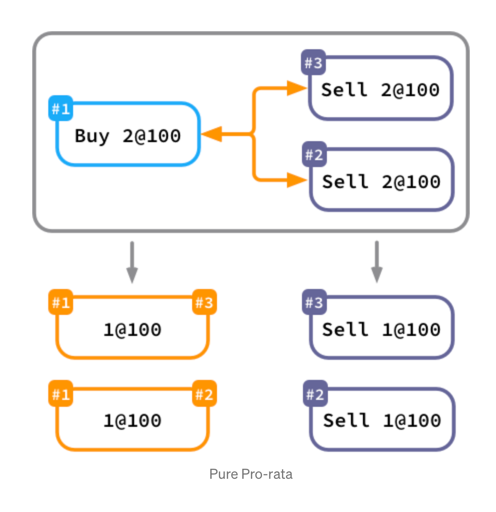
How to build an order book
- Add an order
- Cancel an order
- Execute an order
Heap(PriorityQueue)
- Add an order: O(logN), N is the number of orders.
- Cancel an order: O(logN), N is the number of orders.
- Execute an order: O(logN), pop the peak element and execute.
DDL and Binary Search Tree
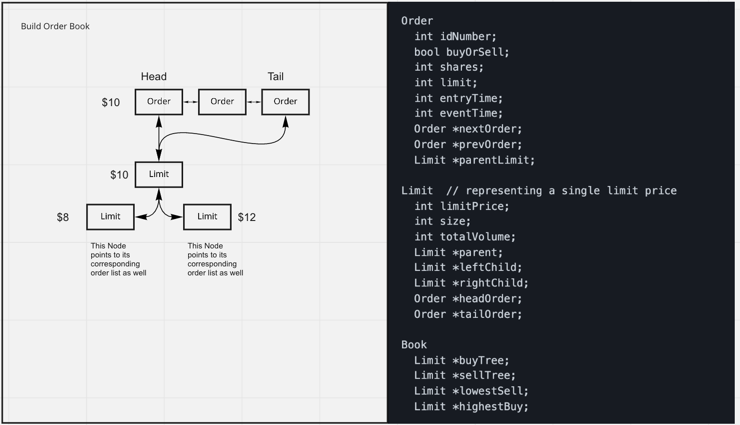
Above diagram is based on this article.
- All orders with the same price are organized by a DDL. New orders will be added to tail.
- Build a BST based on Limit prices, and each Limit node has references to the head order and tail order.
- Order Book object has the reference to Limit object, so the match algorithm could access to the orders.
- Add an order: O(logM) M is the number of Limit prices(it is way less than N, number of orders).
- Cancel an order: O(1).
- Execute an order: O(1).
Message Bus vs RPC for delivering order between services
- Why we want to use message bus product like Kafka.
- Built-in data persistent solution.
- Built-in data replication solution.
- Built-in delivery guarantee.
- Why we DO NOT want to use message bus product like Kafka.
- Dependencies on third-party software.
- Extra resource consumption to deploy and maintain message queue system.
https://doc.akka.io/docs/akka-grpc/current/whygrpc.html#grpc-vs-message-bus
gRPC vs Message Bus
- While built on an efficient non-blocking implementation, gRPC is still ‘synchronous’ in the sense that it requires both
‘sides’ of the communication to be available at the same time. When using a (persistent) message bus, only the producer
and the bus must be up, the consumer does not need to be available, leading to a higher degree of decoupling.
- While gRPC supports bidirectional streaming for each request, when using a message bus the streams are decoupled.
More articles to read:
- https://medium.com/@natemurthy/rest-rpc-and-brokered-messaging-b775aeb0db3
- https://particular.net/blog/rpc-vs-messaging-which-is-faster
How to guarantee latency
- Keep an active websocket session between client and server side for real time data exchange.
- This article compares Kafka with other message bus product in terms of latency, throughput, etc. The conclusion is: Kafka is the best choice.
How order status gets updated on execution
- Using websocket API between Nasdaq and broker, and use server-push to send the order updates to broker.
- Using message bus solution, broker is the consumer.
Failure handling
Match engine(in-memory data) failure
TBA
Service failure
- Multiple replicas
Scaling
- Partition + LB
References
- What is match engine and how it works
- Simulating a financial exchange in Scala
- Youtube Talk
- Building a Trading System - General Considerations
- https://tianpan.co/notes/161-designing-stock-exchange
- https://www.linkedin.com/pulse/how-do-i-design-high-frequency-trading-systems-its-part-silahian/
- https://www.linkedin.com/pulse/how-do-i-design-high-frequency-trading-systems-its-part-silahian-1/
- https://www.redhat.com/files/summit/2015/14552_global-trading-platform-architecture-for-a-wall-street-investment-bank.pdf
- https://github.com/Nasdaq/hackathons/blob/master/README.md
- https://medium.com/geekculture/deep-reinforcement-learning-for-stock-trading-with-kafka-and-rllib-d738b9634675